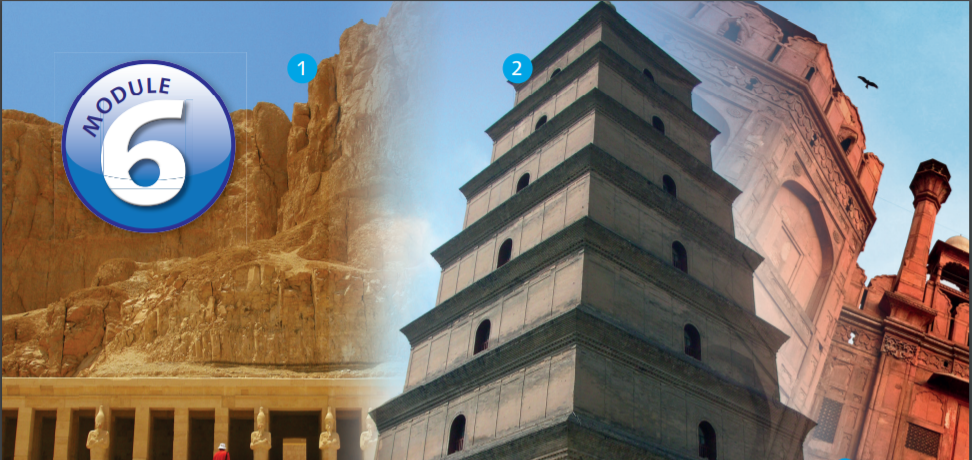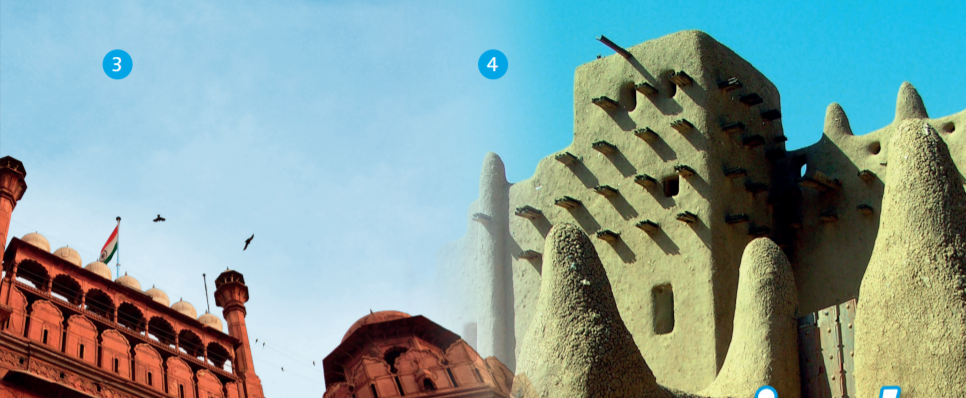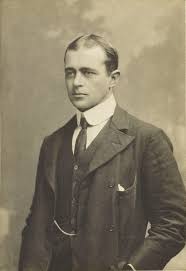Module 6
Lesson 1
SB pages 60-61
They have made important discoveries!


Before you start
Look at the pictures. Can you identify the places? What interesting discoveries do you think have been made there?
Answers
1. The Valley of the Kings in Egypt
2. Xi’an, a town on the Silk Road in Shaanxi Province, China
3. The Red Fort at Delhi
4. The mud-brick mosque at Djenne, Mali Discoveries:
1. Tombs (including the tomb of Tutankhamun) in the Valley of the Kings in Egypt;
2. The Terracotta Warriors at Xi’an in China;
3. The ‘Peacock Throne’ in the Red Fort at Delhi
1 Did your journey to school take a long time today, or not? Listen and find out about a journey your ancestors made. How fast did they travel?
Audioscript
Our earliest ancestors just ate fruit, roots and seeds in the forests of Africa. But one day, about a million years ago, they wandered out of the forests and into the African lands. They discovered many types of animals there and started to eat them! Once they began to eat meat they could travel further and further across the lands because food was always available for them. Our ancestors’ progress was very slow, however. They only advanced 10 km in each generation – that’s about two paces a day! Trails of bone and stone tools have shown that it took them about 25,000 years to leave Africa and explore as far as South-East Asia. Although we don’t know the exact route they followed, we do know that by 250,000 years ago, our ancestors lived in Africa, Asia and Europe. But our ancestors’ journey didn’t stop there. About 11,300 years ago, the world’s climate became very cold. The oceans froze, and there was thick ice between Asia and North America. People and animals walked across the ice from Asia into North America, but it took them another 5,500 years to reach South America! Their journey across continents isn’t possible today; where there was once ice, there’s now a narrow sea called the Bering Strait.
Answers
They were very slow.
They advanced 10 km in each generation.
2 Listen to the words below in context. Try to guess their meanings.
|
root seed progress generation pace trail continent to wander to advance |
Audioscript
1. A radish is the root of a plant that grows under the ground.
2. Ayman planted a seed that grew into a beautiful flower.
3. I will reward you for your progress because you have improved a lot.
4. The first generation of settlers is the first group of people to inhabit an area.
5. My little brother moved forward a couple of paces.
6. We followed the trail of bricks that led the way back home.
7. There are seven continents in the world, and Asia is one of them.
8. Mum closed the gate because she didn’t want the baby to wander onto the street.
9. When Nour saw her teacher in the supermarket, she advanced towards her to say hello.
3 Read the Listening Strategies. Then, listen to the figures below. Try to write them down.
Listening Strategies: Listening to figures
● Listen to the figures carefully.
● While you listen, follow with the numbers written on the page.
● Focus on the group of numbers on the left of the comma.
● Try to write down the number as you hear it.
● If you can’t write it down, repeat the number to yourself until it is clear in your mind.
|
1,000 5,500 25,000 100,000 250,000 1,000,000 |
Audioscript
one thousand
five thousand five hundred
twenty-five thousand
one hundred thousand
two hundred and fifty thousand
one million
4 Which two important discoveries helped our ancestors to cross continents? Discuss with a partner.
Answer
Many types of animals and the frozen ocean or the thick ice between Asia and North America
5 Look at a world map and find the Bering Strait. (school library)
Module 6
Lesson 2
Student’s Book pages 62–63
Across continents
Before you start
What do you enjoy about travelling? How do you think travel today compares to how it was in the past?
Answers
Students’ own answers
Reading
1 Look at the title of the text below. Do you think Scott won this race? Which continent do you think he was going to?
Answers
Scott did not win the race. He was going to the Antarctic.
2 Listen to the words below in context. Try to guess their meanings.
|
blizzard, condition, expedition, explorer, exposure, frostbite, pioneer, tragic |
Audioscript
1. We had to wait till the blizzard calmed down because we couldn’t walk in such cold and rough weather.
2. Mr Jamal could not work under such bad conditions, so he took the day off.
3. The scientists went on a great expedition to find a lost temple.
4. When I grow up, I want to be an explorer and discover new places in the world.
5. Three men died of exposure in the very bad weather of the Antarctic.
6. Cover your hands and wear warm socks because frostbite is easily got in freezing weather.
7. I wish I were the pioneer who was first to explore Antarctica.
8. That car accident, which hurt many people, was very tragic.
3 Read the text. What problems did Scott face on his journey to the South Pole? Write a summary about these problems and discuss Scott’s journey with a partner. Refer to the map on page 87 to locate the places mentioned in the text.
Answers
Scott and the men on the expedition met awful conditions. Their sledges and ponies could not cope. Even the dogs had to turn back. They struggled through blizzards and eventually died of starvation and exposure.

Scott’s race to the pole
For the past century, people have admired Robert Falcon Scott – a pioneer who attempted to be the first person to the South Pole.
In 1910, Scott led his second expedition to the Antarctic. He and his crew arrived in January 1911 and set up camp in McMurdo Sound. As they travelled south, they met awful conditions. Their sledges and ponies could not cope. Even the dogs had to turn back. Eventually there were just five men left – Scott, Wilson, Oates, Bowers and Evans. They battled on, but when they reached the South Pole on 17 January, 1912, they found a small tent with a Norwegian flag. The Norwegian explorer Roald Amundsen reached the pole a month before Scott.
Like all people who have been beaten, the men were extremely disappointed when they started their return journey. They struggled through blizzards. Evans died in February and then Oates, who had severe frostbite, walked out into the freezing conditions on his thirty-second birthday. He didn’t return. The remaining three men finally died of starvation and exposure on 29 March, 1912. Tragically, they were only twenty kilometres from a food supply. Eight months later, a search party found their tent and their diaries. Their notebooks, letters and diaries described the tragic events.
Since then, Scott’s bravery has been greatly admired by the British people, and he has become a national hero.
4 Answer the following questions related to the text on page 62.
1. Why do you think Scott went on a journey to the South Pole?
2. Do you think Scott deserves to become a national hero? Why / Why not?
Students’ own answers
Lesson 2
Activity Book page 47
They have made important discoveries!
Vocabulary
1 Complete the statements and questions with the words from the box.
|
Expedition tragic continents blizzard explorer advance seeds |
1. Europe is one of the …………….. I’ve always wanted to visit.
2. Will you get me some …………….. from the market? I want to grow some lettuce.
3. How many days does the need to complete the …………… to the jungle?
4. It’s going to take the sailors a lot of effort to …………. at sea because of the terrible …………… .
5. Yesterday, my parents told me about a big accident that they saw on their way back home. It was …………….. !
1. continents
2. seeds
3. explorer/expedition
4. advance/blizzard
5. tragic